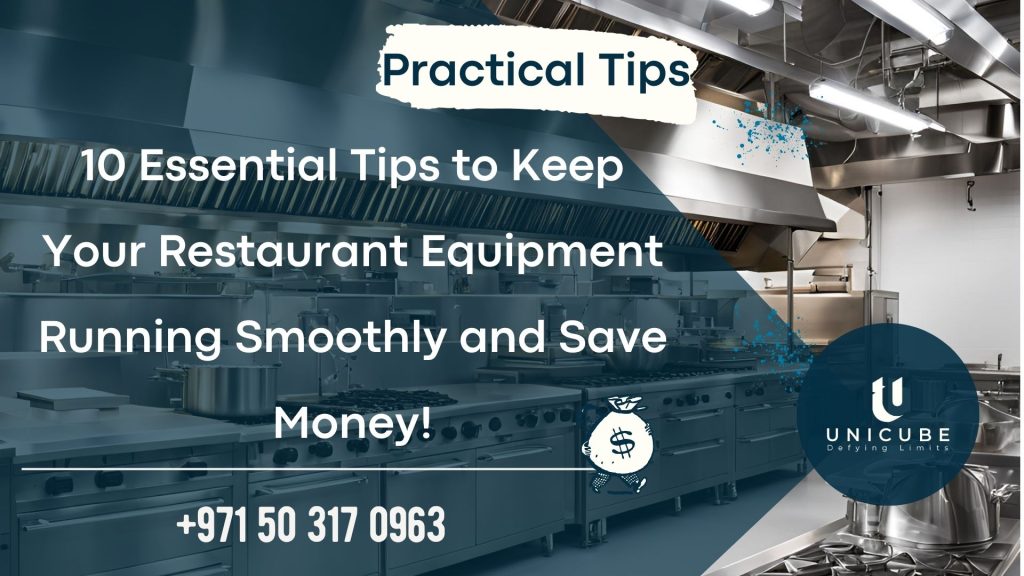Want to keep your restaurant equipment in peak condition and avoid costly breakdowns? The solution is simple: preventive maintenance! Regular maintenance not only extends the lifespan of your equipment but also reduces the risk of unexpected repairs. In this article, we provide practical, actionable tips for maintaining restaurant equipment effectively, answering frequently asked questions about preventive maintenance to keep your business running smoothly.
Top Preventive Maintenance Tips for Restaurant Equipment – Your Guide to Reducing Downtime!
1. Conduct Regular Equipment Inspections
Routine inspections for all equipment—such as ovens, fryers, and refrigerators—help you detect minor issues before they turn into major problems. Studies show that preventive maintenance can reduce equipment breakdowns by up to 40%, keeping your operations smooth.
2. Regular Cleaning – Essential for Long-lasting Equipment
Cleaning equipment regularly protects it from corrosion and debris buildup, which can impact performance. For instance, grills and stovetops can get damaged from accumulated grease, so be sure to clean them after each use to keep them running efficiently.
3. Establish a Maintenance Schedule
A clear maintenance schedule ensures you don’t overlook important inspections and cleanings. A simple calendar or software solution can help you track each piece of equipment’s maintenance needs, making preventive care consistent and effective.
4. Replace Worn Parts as Needed
Worn parts can lead to bigger, costlier issues if left unattended. Check components like filters and pumps regularly, replacing them as necessary to avoid potential damage to the entire piece of equipment.
5. Train Your Team on Proper Equipment Use
Proper usage is essential to avoid breakdowns caused by misuse. Training your staff on the right way to operate each piece of equipment reduces wear and tear, ensuring safer and more efficient operations.
6. Partner with a Professional Maintenance Company
Sometimes, partnering with specialized maintenance companies is the best solution. These professionals have the expertise to handle complex equipment and can provide tailored maintenance plans to meet your specific needs.
7. Follow Manufacturer Guidelines
Always adhere to the manufacturer’s instructions, as they’re designed to optimize the efficiency and lifespan of your equipment. Avoid exceeding the recommended usage limits to prevent unnecessary wear.
8. Ensure Proper Ventilation
Equipment like ovens and stoves should be placed in well-ventilated areas to prevent smoke and grease buildup, which can cause malfunctions. Good ventilation enhances equipment performance and reduces the likelihood of damage.
9. Conduct Routine Electrical Checks
Regularly inspect the power supply and voltage levels to protect equipment from electrical issues, which can be highly damaging. Ensure stable voltage and secure electrical connections for uninterrupted operation.
10. Monitor Equipment Performance Consistently
Keep a close eye on how your equipment is functioning. If a machine starts making unusual noises or its performance declines, it might indicate an underlying issue. Monitoring allows for early intervention, saving you from expensive repairs.
FAQs About Preventive Maintenance for Restaurant Equipment
Q: What is the difference between preventive and corrective maintenance?
A: Preventive maintenance aims to prevent equipment breakdowns through regular checks, while corrective maintenance is focused on repairing equipment after issues arise.
Q: How often should preventive maintenance be performed?
A: It depends on the type and usage of equipment, but ideally, preventive maintenance should be conducted every 3 months to ensure optimal performance.
Q: How can I create a preventive maintenance schedule?
A: Use scheduling software or a simple calendar to organize cleaning, inspections, and parts replacements for each piece of equipment, making maintenance consistent and hassle-free.
Conclusion
Preventive maintenance for restaurant equipment is more than just a smart choice—it’s a necessity that guarantees the efficiency and long-term savings for your business. By following these tips, you can maximize your equipment’s performance and enhance customer satisfaction. Preventive maintenance is the key to creating a stable, reliable work environment in your restaurant.
Do you have any experiences with preventive maintenance in your restaurant? Share your insights or questions in the comments below!
Keep your restaurant equipment running smoothly and avoid costly breakdowns with these essential preventive maintenance tips. Learn practical steps to maintain equipment and reduce expenses.


Hi, this is a comment.
To get started with moderating, editing, and deleting comments, please visit the Comments screen in the dashboard.
Commenter avatars come from Gravatar.